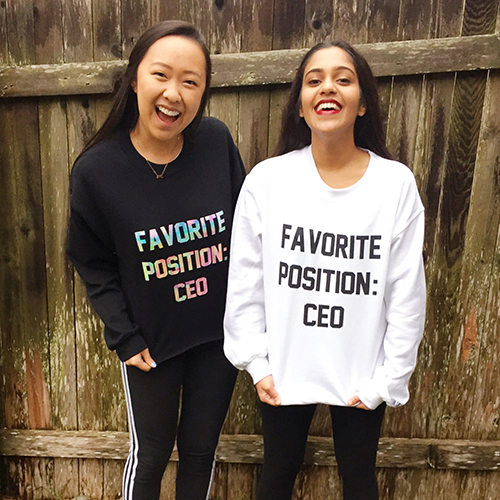Two college students, Angela Jin and Nishiki Maredia, channeled their love for boy band One Direction into a social justice movement.
 Entrepreneurs Angela Jin and Nishiki Maredia’s big idea started where many great ideas do: at a One Direction concert. It was the summer of 2014. Jin, 21, a business marketing major, was about to start her sophomore year at Boston College, and Maredia, 20, was about to begin her first semester at the University of Texas. Their friendship was strengthened that summer when the two conspired to sneak backstage at a One Direction concert.
Entrepreneurs Angela Jin and Nishiki Maredia’s big idea started where many great ideas do: at a One Direction concert. It was the summer of 2014. Jin, 21, a business marketing major, was about to start her sophomore year at Boston College, and Maredia, 20, was about to begin her first semester at the University of Texas. Their friendship was strengthened that summer when the two conspired to sneak backstage at a One Direction concert.
“We…hatched this plot to sneak backstage,” Maredia says. “We hung out almost every day that summer and plotted. It truly bonded us in a way that doesn’t always happen.”
Fast-forward four months, after Maredia and Jin spent their fall semester struggling through bouts of anxiety and depression, and the two landed back in their shared hometown of Austin during winter break. They started to hatch their second greatest plan. Why not channel their love for One Direction and their desire for a personal cause into a T-shirt business?
Today, their brainchild has morphed into international apparel brand 1950 Collective, an online store specializing in producing part fandom, part social-justice-movement minimalist clothing.
“It was something we could do and see direct results. It really helped our mental health,” Maredia says of their business. “I would call [Angela for] hours a day. That’s social interaction you don’t get when you’re going through a depression.”
The bottom line was, Jin says, the two wanted to beat the One Direction merchandise team at their own game by releasing up-to-date T-shirts that fans could feel just as comfortable wearing at home as they do to class or on a hike, specifics they noticed the One Direction team didn’t execute so well.
One of 1950 Collective’s first great successes was a shirt featuring the phrase “Girl Almighty,” a One Direction lyric that Maredia says was not only a fan favorite, but was also perfectly feminist.
Today, Jin and Maredia maintain their feminist and inclusive lifestyle brand by selling shirts in sizes as large as 4XL and printing phrases like “Favorite Position: CEO” and “No Ban No Wall” on their products.
 The team’s move toward social-justice-focused clothing happened organically, Maredia says, with the designs often originating from conversations people have online.
The team’s move toward social-justice-focused clothing happened organically, Maredia says, with the designs often originating from conversations people have online.
“People want to be able to wear what they’re tweeting,” she explains.
To no surprise, she says, the same group of teens that seeks stylish One Direction merchandise is also incredibly passionate about race, gender and religious equality. Today, 100 percent of profits from 1950 Collective’s new social-justice line go directly to a number of causes, including Black Lives Matter and the National Center for Transgender Equality.
“Both of us are super involved in social justice and we thought, ‘If we have this platform and all these women follow us, we should be putting that to good use,’ ” Maredia says.
The plan worked out. In the young company’s brief two-and-a-half-year existence, it has grossed almost $300,000. Most recently, Jin and Maredia were recognized as two of Glamour’s 2017 College Women of the Year.
Although profits are important, Jin says the team gets most excited about the company’s 65,000 (and growing) Instagram and Twitter followers. The company’s social-media platforms, the duo confides, are what keep them close to their customers.
Jin remembers the first time the two received an email from a customer who was struggling with depression and asking for help. They sent an email back reminding her that although they weren’t medical professionals, they encouraged her to seek support from family and friends. Six months later, the girl reached back out, saying she’d followed their advice, started therapy and was on a positive road to recovery.
“It was just such a moment that our impact of sharing our stories and getting out there—and being a channel for mental health—has long-lasting implications for mental health,” Jin says. “That was one of the most special interactions I think about, in terms of what this company does.”
Despite the 1,950 miles between the two (Yes, the same number in their company’s name.), their mutual support for each other endures.
The two say they have no intentions of shutting down 1950 Collective when Jin graduates and moves to Los Angeles to work in the music industry. (Her goal is to increase Asian-American musical representation.) Maredia says they’re open to change and Jin confirms that regardless of what the future holds, the two will continue to fight for equality.
“I will always consider [1950 Collective] a small business,” Jin says. “We’ll never have a corporate feel and I like to think we’ll always fight for the underdog and it’ll just keep pushing us forward.”


